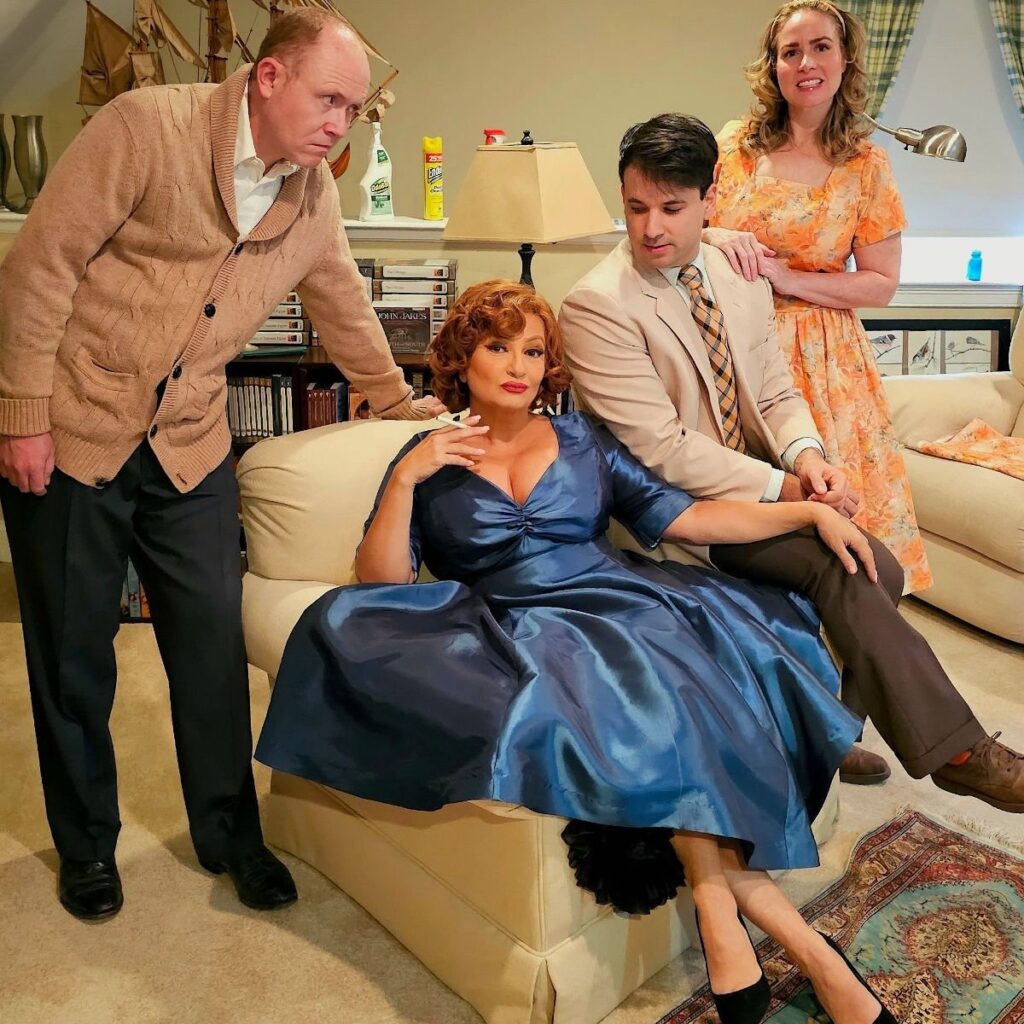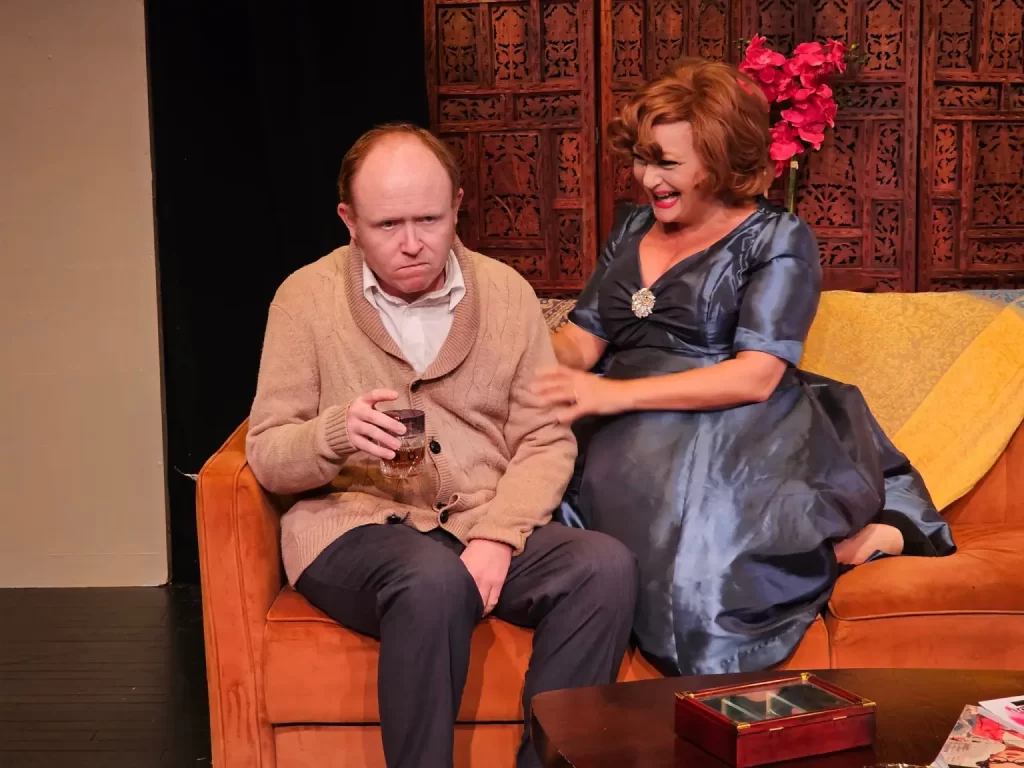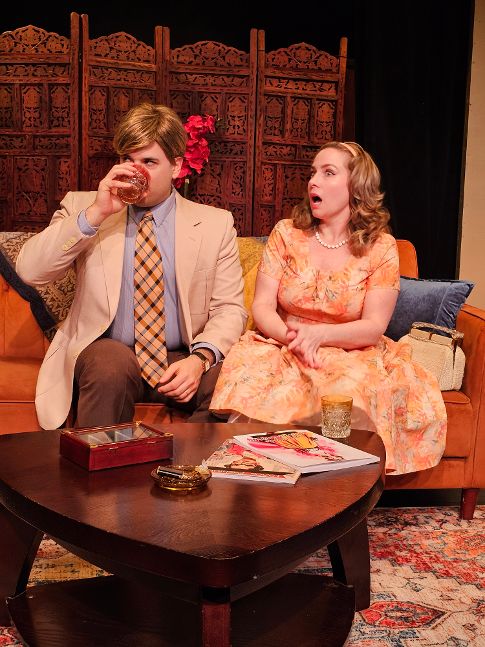
“Who’s Afraid of Virginia Woolf” – Written by Edward Albee. Directed by Ben Delatizky. Presented by Theater UnCorked at the BCA Plaza Black Box Theatre, 539 Tremont St., Boston, December 6–10, 2023
by Mike Hoban
Theatergoers looking for an antidote to the multiple versions of A Christmas Carol or the endless stream of holiday-themed programming on the Hallmark Channel hit pay dirt with Theater UnCorked’s bleak but stunningly executed Who’s Afraid of Virginia Woolf?” Revived for a short run at the BCA Plaza Black Box Theatre in early December, the production was a master class in acting by Boston favorites Shana Dirik and Brooks Reeves, who were ably supported by Brooke Casanova and Anthony Rinaldi and skillfully directed by Ben Delatizky.
Winner of the Tony Award and New York Drama Critics Circle Award for Best Play, this theater classic is much like watching a true crime show about serial killers – you can’t stop watching no matter how despicable their actions. But instead of murder and mayhem, we get crimes of the soul.
It’s 2 AM on a Saturday night, and middle-aged couple George and Martha have returned home from a faculty party at the college where George is a professor and Martha is the dean’s daughter. They’re a little buzzed, and Martha is singing the play’s title to the tune of the 1933 Disney song, “Who’s Afraid of the Big, Bad Wolf?” when she springs a surprise on George – after party guests are on their way. Specifically, Nick, a twenty-something biology professor, and Honey, his mousy, “slim-hipped” wife, have been invited to their home for a nightcap and, unbeknownst to them, for some “fun” and (sadistic) games.

George and Martha are ripping into each other before their guests arrive. When the guest do arrive, instead of hiding their animosity toward one another, they turn up the heat and then turn those flamethrowers on their guests. We soon learn what is at the black heart of their disturbed relationship. George isn’t the man Martha hoped he would be when they married. He’s lost the confidence of her domineering father after being touted as the man who would eventually replace him as college dean. Instead, he’s relegated to the role of associate history professor with no hope of advancement. Martha belittles him at every turn, reminding him of his failings, especially when she’s drunk, which she always is. But George is not an innocent victim of her abuse. The acerbic barbs directed towards his wife aim straight for the heart, and he strikes with the precision of an Olympic archer. This sample exchange is pretty routine for the embittered couple:
George: Try and I’ll beat you at your own game.
Martha: Is that a threat George, huh?
George: It’s a threat, Martha.
Martha: You’re gonna get it, baby.
George: Be careful Martha. I’ll rip you to pieces.
Martha: You’re not man enough. You haven’t the guts.
At first, Nick and Honey squirm uncomfortably at the exchanges, and one wonders why they don’t just leave. But George soon draws Nick into his web of sickness, plying him with booze and getting him to reveal far more than he should about his marriage, and George makes him pay dearly for his honesty.
If the idea of watching two-plus hours of a pair of angry drunkards insulting and humiliating each other and their unsuspecting guests may not sound like a fun evening, it’s not. But great theater isn’t always fun. Albee’s writing captures the darkness of the soul and the self-loathing of the alcoholic (he presumably was one himself), and he perfectly portrays the Twilight Zone feel of a late-night booze-fueled “party” that has gone on for far too long. And Albee’s characters are far from one-dimensional. There’s a kind of warped tenderness and compassion between George and Martha, even as they leave each other’s psyches bruised and bleeding. There are also plenty of laughs, especially early on, before the acerbic barbs begin to cut deeper and deeper.

The intensity of Albee’s writing means that the leads must be up to the task, and the work by Dirik (multiple IRNE Awards) and Reeves (IRNE Award winner) is equal to anything I’ve seen on the Boston stage in years. And Casanova as Honey also deserves a shoutout for her facial expressions alone in response to the madness around her. Performing this piece in the cozy confines of the Plaza Black Box Theatre was also a huge plus, a testament to the power of up-close live theater. The only downside? More people should have witnessed this gem. Here’s hoping the award committees and Best Of lists take notice. For more information about the show, go to: https://www.theateruncorked.com/

